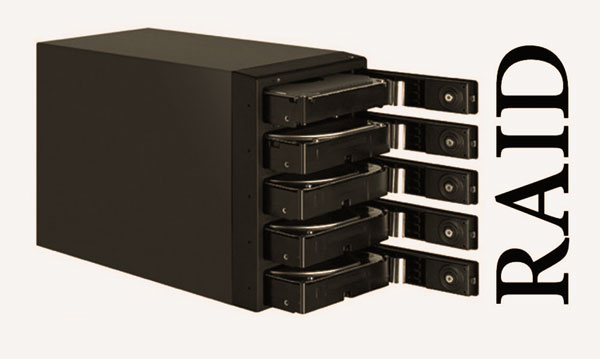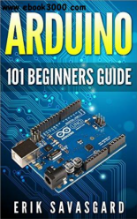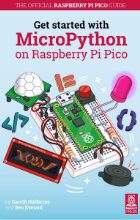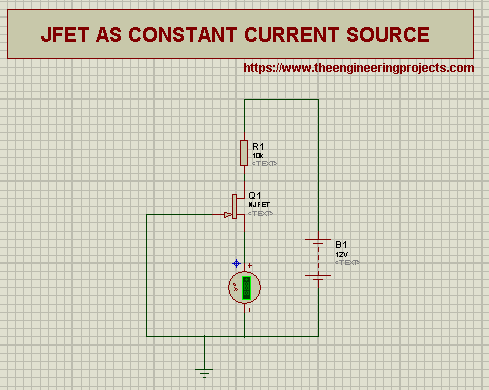

JFET Applications | Constant Current Source | Chopper


- Drain
- Source
- Gate
Resistor
Resistor is an electrical device. we define the resistors as:"A Resister is a two terminal Passive electrical device that shows the electrical resistance and is useful in almost every Circuit.Resistors can be used to reduce or control the flow of current , terminate transition lines and such other functions.
Pinch off voltage
The basic Definition of Pinch off voltage is:when the value of voltages is less than the pinch off region, the voltage enters to another region called ohmic region of JFET and the transistor acts as a resistor in this region."The voltage applied between the Drain and the source at which the current maximum current flows through the circuit provided the Gate voltage is zero is called the Pinch off voltage."
Controlling Voltage
The Controlling Voltage of Junction field effect transistor is defined as: "The controlling Voltage is the voltage of transistors from gate to source. To set its value, the Voltage from gate to source is made negative and it is referred as Vgs." FET's are widely used in the worlds of electronics because of their size and the performance. We'll apply JFET's in the making of two of circuits:- Constant Current Source.
- Chopper.
Constant Current Source
A Field Effect Transistor can be use as a constant current Source. That spell out that if JFET's are designed so, they can provide a constant current across the load resistor, no matter how much current is provided at its input. The ability is due to the near horizontal line in the drain characteristics of the JFET. Recall that resistor is a two terminal Device that reduces the current flow, divide voltage or adjust signal lines. But, carefully Controlled JFET can be used to overcome the resistance through the resistor that come in between the JFET and the Voltage source. In the circuit, when the Vgs is greater than the pinch off voltage. mathematically,V-IR>|V|
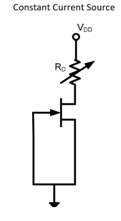
Implementation in Proteus ISIS
To make the circuit for Constant current Source, we need the Components as:Component Required:
- Junction Field Effect Transistor
- Resistor
- Ground Terminal
- Direct Current Power Supply
- Connecting Wires
Procedure
- Fire up your Proteus Software.
- Choose the JFET and Resistor from the Pick library through the "P" button.
- Take the Ground Terminal from Terminals library from the left most tab.
- Take DC power source from the "Generator mode".
- To measure the Current we'll add a DC ammeter from the "Virtual Instrument Mode".
- Connect the Source with the Drain thorough a wire.
- Join the Ground Terminal with the wire that connects Source and Gate.
- Connect the Components on the Working area according to the diagram:

- Double Click the Battery and give it a value of 9 volts.
- Double click the voltmeter and change the display Range to milliamps.

- By the same token, Double tap the resistor and give it the value of 1k ohm.
- Record the values of the ammeter.
- At first observations, Change the value of resistor to 1kohm.
- Pop the play button.
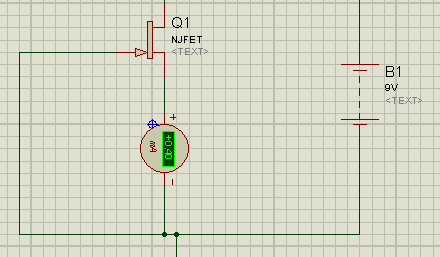
- Take seven reading by changing the value of resistor and make a table.
Resistance Current 1k ohm 0.40 *10-3 2k ohm 0.40 *10-3 3k ohm 0.40 *10-3 4k ohm 0.40 *10-3 5k ohm 0.40 *10-3 6k ohm 0.40 *10-3 7k ohm 0.40 *10-3
Chopper
A Chopper is the application of Transistor that show us the output as the square wave. We define the Chopper as: "Chopper is an electronic circuit used to take the amplified Direct current by using some type of transistor or other device." One can use any kind of transistor e.g Bipolar Junction Transistor tor make the Chopper circuit. But, Junction Field Effect Transistors are better for this purpose due to the field control of the JFETs. In Choppers, the FET act as a variable resistance.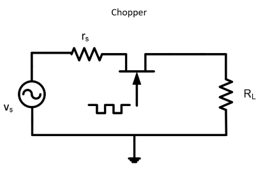
Implementation of Choppers in Proteus ISIS
- Fire up your Proteus ISIS.
Material Required
- Junction Field Effect Transistor
- Resistor
- Alternating current source
- Ground
- Oscilloscope
- Pick the Vsine , Resistor and JFET from the Pick library by the mean of "P" button.
- Take the Oscilloscope form "Virtual Instrument Mode" and fix it just above the Circuit.
- Connect Channel A just after the AC source and channel B with the Source.
- Put the Ground terminal below the circuit by choosing it from "Terminal".
- Change the value of resistance connected to AC as 100ohm.
- Change the value of resistance connected to Source as 200ohm.
- Give the frequency to 1000Hz and Amplitude of 12V to Vsine.
- Join the circuit according to the image given below:

- Press the Play button to simulate the graph.
- Set the Value of Channel A to 1V.
- Set the channel B to 20V.

×
![]()








 1 user
1 user






 Continue Wishlist
Continue Wishlist





 Getting Started Guide
Getting Started Guide
 Help Center
Help Center
 Contact us
Contact us
 Doist Blog
Doist Blog
 Privacy
Privacy
 Security
Security
 Terms of Service
Terms of Service
 What's new: Channel Descriptions
What's new: Channel Descriptions





 Proteus
Proteus ayeshayounas
ayeshayounas 0 Comments
0 Comments








 2.3k
2.3k
 953
953
 921
921
 2.1K
2.1K
 Junction Field Effect Transistor
jJFET as constant current source
application of JFEt
Chopper by jfet
JFET
Junction Field Effect Transistor
jJFET as constant current source
application of JFEt
Chopper by jfet
JFET
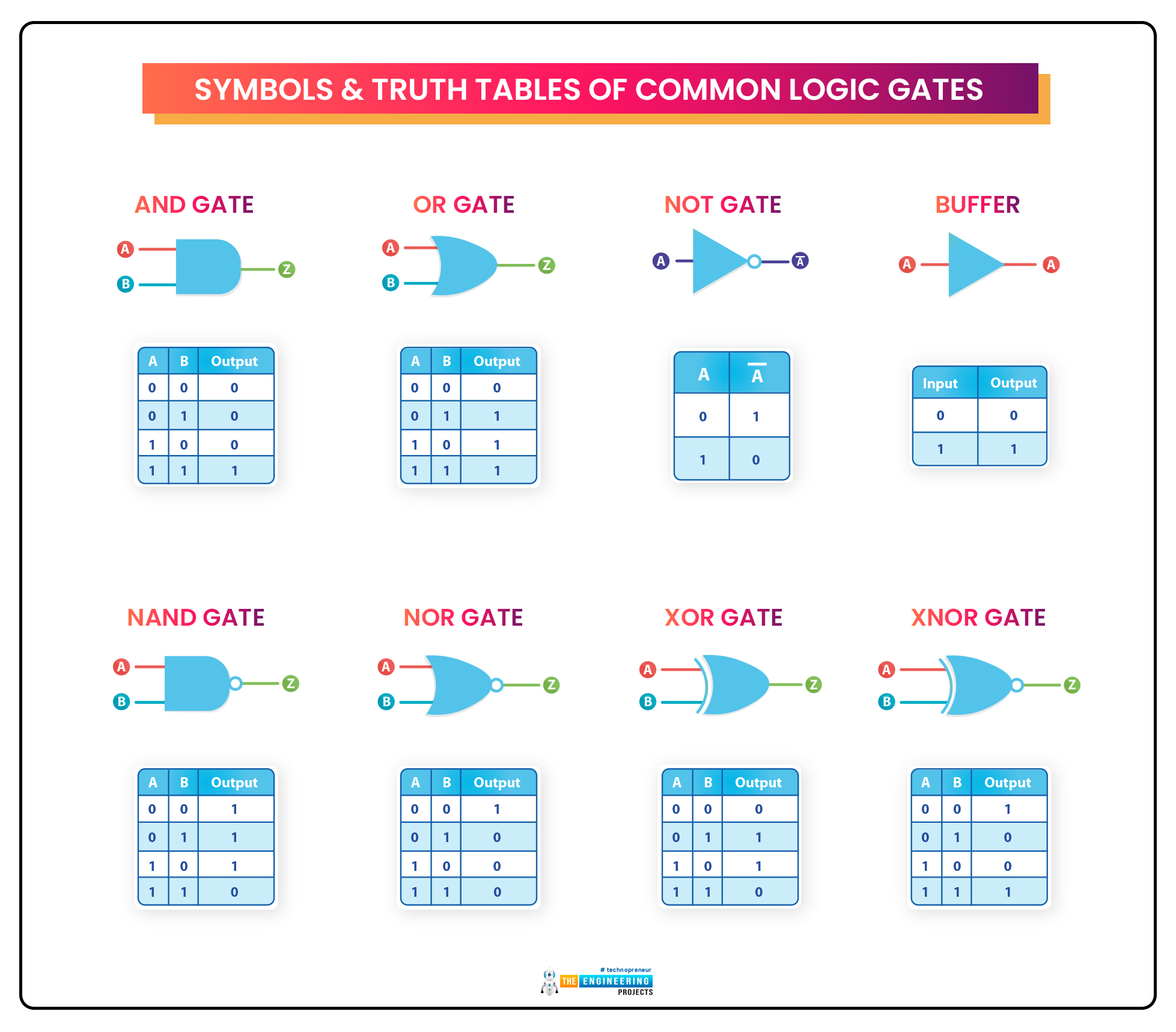
 Sunday, December 27, 2020
Sunday, December 27, 2020